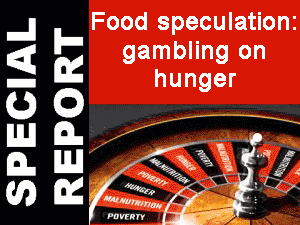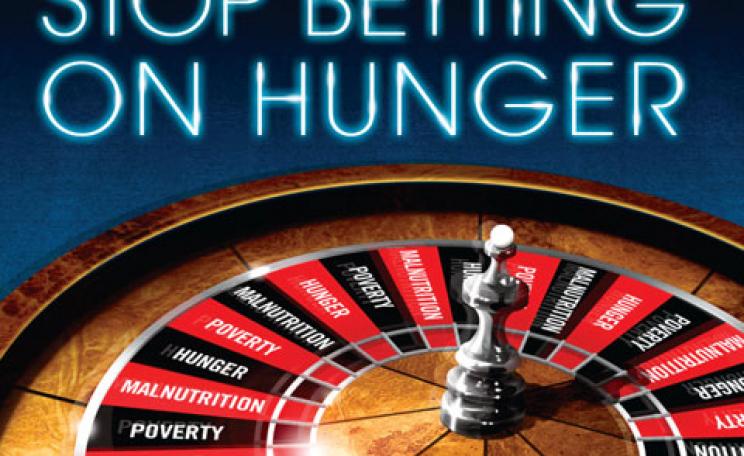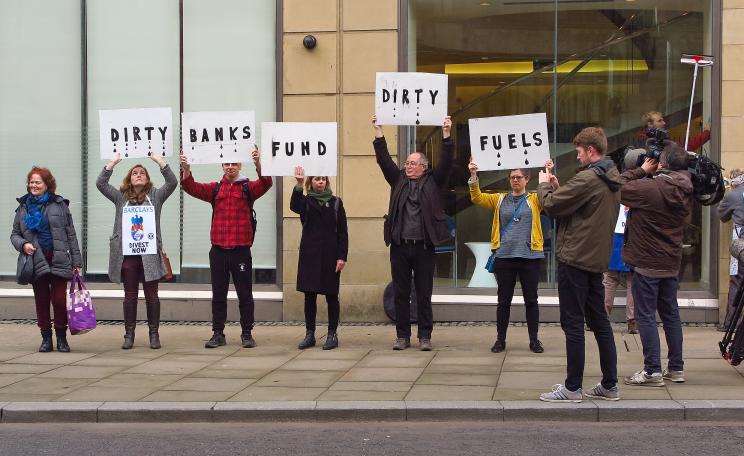In 1991, Goldman Sachs had an idea that changed commodity-trading forever.
J. Aron & Co., Goldman’s commodities trader, wanted to enter into a swap with a pension fund that wanted to add commodities to its portfolio. Raw goods were looking attractive at the moment. Inflation had risen more than 6 per cent the previous year, and the economy was in the recession that, in 1992, would elect Bill Clinton president.
The pension fund wanted to buy into commodities to manage its financial risk, which Congress had said it could do. Goldman was willing to do the deal, but as a speculator that didn’t rely on producing or using physical goods for its business, J. Aron could only do so much before it bumped up against Commodity Futures Trading Commission (CFTC) limits on positions - that could be held by a speculator. Position limits, put in place to prevent market corners and manipulation, date to the Commodities Exchange Act of 1936.
The pension fund didn’t want to invest in a single commodity - corn, or wheat, or natural gas have too many individual quirks, - but it did want to benefit from commodities as an asset class, buying into oil, natural gas, corn, wheat, and other goods. So, Goldman created an index that would track prices of a predetermined selection of commodities, allowing index-fund buyers a way to speculate in physical goods. That let the pension fund manage its risk, often backing that index by buying up the actual futures of the foods, fuels, and metals the index covered.
To make sure futures holdings matched the investment, Goldman asked the CFTC for an exemption from speculative limits on crop futures under a loophole Congress had opened in the 1980s. The CFTC granted the request.
Investment banks could buy crop contracts, just like a wheat merchant. Food no longer made for just a balanced diet. It balanced portfolios too, opening the doors for millions of investors to have a personal stake in food and energy markets beyond their groceries and gas tanks.
Goldman’s innovation didn’t instantly change trading. Shifts in political winds posed a danger to any bank getting overly involved in commodities. Bush’s CFTC could give an exemption, but someone else's could take it away. The stock market was about to begin nine straight years of gains. Corn, thanks to the productivity of U.S. farmers and stable world markets, couldn’t compete with that.
Stock market collapses: food takes over
The year 2000 was a turning point. The Commodity Futures Modernization Act, passed by Congress as Clinton was leaving office, largely exempted over-the-counter derivatives from regulation. George W. Bush’s election as president ensured that the CFTC would favour deregulation. For free-market advocates, the creative power of modern markets would be unleashed –just as crops, energy, and metals were about to look better than ever as an investment.
A quarter-century of stock-market triunph was ending. The Dow Jones Industrial Average reached 11,750 on January 14, 2000, more than 12 times its value 20 years earlier. Corn that day closed at $2.19 a bushel – down exactly 70.25 cents from where it stood at the end of the 1970s.
The new decade wouldn’t be like the previous two. The dot-com bubble burst, starting a recession that began before September 11, 2001, terror attacks and lingered beyond it. Stock markets bottomed out in 2002 after the Dow lost 39 percent of its value. Real state was the next bubble. The housing boom took markets to new heights – then, as prices collapsed, to another plunge and an even deeper recession – this time a 54 percent drop from October 2007 to March 2009.
Investors accustomed to scarcely interrupted stock-market gains needed something that could restore a semblance of balance to their financial lives. Low interest rates made parking money in a bank account unattractive. Real estate that was supposed to rise forever, didn’t. But everyone needs to eat. Investors wanted a save haven from a stock-market boom gone bust.
Can the speculation be stopped?
The idea that speculation in food may drive up prices, increasing volatility and aggravating global hunger, remains highly controversial, and not just to the traders and banks who profit from it. Many of the dozens of academic studies completed since the food crisis question the connection.
Speculators don’t drive crop markets because futures contracts, which can be bought, sold, and rolled over to infinity, are separate from physical markets, argues one school of thought.
Those studies attempt to debunk what the authors consider fallacies and misinterpretations of how speculation affects commodities markets. In these studies, the jump in commodity prices that rose with new money is dismissed as coincidence – they maintain that commodities exchanges would have seen the same sharp price gains whether index funds had been there or not.
Other research doesn’t let speculators off the hook, finding that prices of publicly traded commodities linked to index funds are moving increasingly in lockstep, indicating that commodities have become financialised as an asset class. Still more papers argue that the introduction of multibillion index funds that are holding onto futures for decades regardless of immediate circumstances – the elephants in the kiddie pool - makes futures prices less likely to fall and more likely to rise, since the funds will buy a futures contract expecting it to increase over the longer term, even when shorter-term prospects aren’t clear.
The research debate is of intense interest to CFTC Commissioner Bart Chilton, who emerged during the 2008 food crisis as the panel’s top critic of the role investors may play in driving up food costs. Early in 2011, he was staying more quiet on regulation - 'I’m keeping my powder dry,' he joked - because the price and political situation was different in 2011 than in 2008.
The second food shock saw stock markets rising with commodities prices as the global economy grew, a classic story of supply and demand. Real-world explanations for price gains - China, oil, weather- were more up-front the second time around.
The CFTC, led by Gary Gensler, an Obama appointee and 18-year Goldman Sachs veteran, was at its most willing to regulate big-bank trading since the Clinton administration. The Dodd-Frank bill, named for its Senate and House sponsors, tightened limits on how many crop futures a speculator could hold even as it continued to exempt buyers of actual physical commodities, called end-users, from limits. It also brought under regulation many trades done outside exchanges, and it expanded the agency’s ability to collect information on exactly who was doing what in which commodities markets.
Banks step up lobbying efforts
The legislation inevitably attracted a swarm of lobbyists to the once-quiet CFTC building on M Street. In 2010 the commission met with 199 different lobbying clients, according to records examined by the Washington-based Center of Responsive Politics – the highest since the centre began tracking the records in 1998, 90 per cent more than in 2009 and 165 per cent more than in 2008.
Chilton said he met with the same lobbyist, representing three different companies, in the space of two weeks. Each time, the attorney argued that his client was exempt from the law, or that implementation ought to be put off. Financial interests called for caution and gained new allies from Congress, as Republicans sceptical of government regulation took control of the House of Representatives and eroded the Democratic majority in the Senate.
The voices urged restraint, for fear that wrong moves could actually drive trading from U.S. markets, sending them to less-regulated areas overseas.
'It is critically important that the implementation of these complicated reforms be done in a manner that avoids disruption and allows continuing access to derivative instruments,' said Steve Bunkin, a managing director at Goldman Sachs, before the committee.
The rest of the world watched the United States and worked on its own rules. European markets – the ones to which U.S. capital would allegedly flee should speculators be reined in too tightly – would put their own limits in place to ensure that flights of capital across the ocean wouldn’t occur, said the European’s Union’s financial services commissioner, Michel Barnier.
The rising economies of Brazil, Russia, India, China, and South Africa called volatile prices a threat to their growth and asked for greater global regulation of derivatives markets. The academic speculation debate remained unresolved. By the middle of 2011 the CFTC was delaying new regulations, needing more time to complete them. Chilton predicted that in the end new rules would make markets less vulnerable to wild swings than before.
'The limits will decrease volatility both up and down, and keep swings from being wider,' he said. 'I think we’re going to get to the right point, ultimately,' he said.
This is an extract from Alan Bjerga's new book - Endless Appetites: How the Commodities Casino Creates Hunger and Unrest. It is being published by Wiley's Bloomberg Press in October 2011
| READ MORE... | |
 |
NEWS ANALYSIS Special report Banks should end 'secretive' trade in food commodities Financial speculation in key commodities, like wheat and maize, is being linked to recent volatile food prices but attempts to regulate are being delayed by lobbying from the banking sector |
 |
COMMENT Special report Food speculation 'boom' linked to volatile food prices In a major investigation and film, the Ecologist takes a look at how volatile financial speculation on food commodities is causing hunger and poverty in Mexico - and around the world |
 |
NEWS ANALYSIS Photo story Mexico's corn heritage eroded by free-trade and food speculation A combination of free trade and volatile food speculation is squeezing small-scale Mexican maize farmers and allowing agribusiness to dominate |
 |
COMMENT Special report Time to ignore bankers and start fixing our broken markets It's time we stopped listening to the banking sector and started pressuring MPs and MEPs to regulate food speculation, argues Deborah Doane |
 |
INVESTIGATION Special report Mexico's poor suffer as food speculation fuels tortilla crisis A surge in financial speculation on maize is causing vastly inflated prices for corn tortillas - a sacred staple in Mexico - and threatening the health and livelihoods of the country's poor. Tom Levitt investigates |





